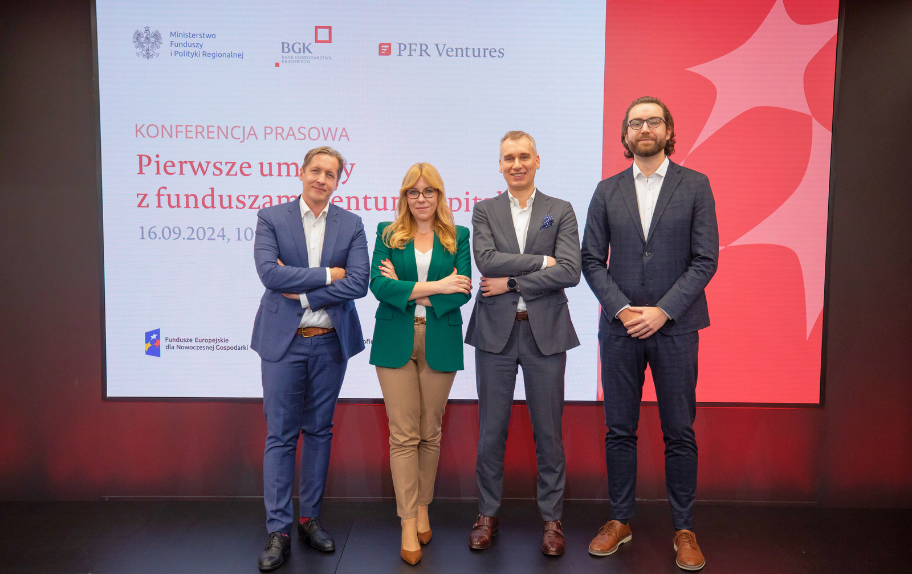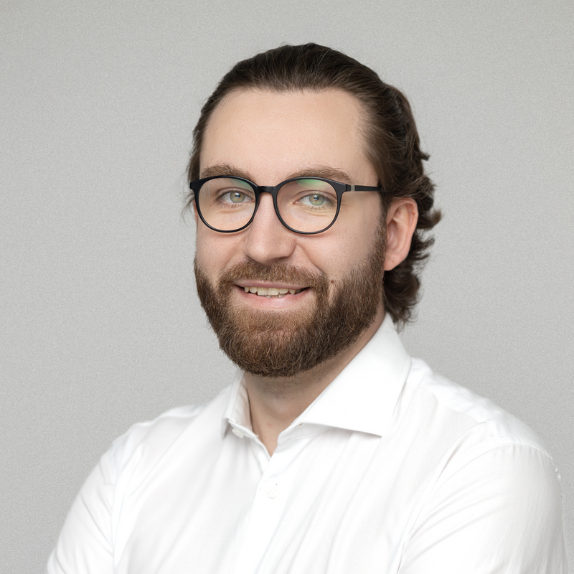From fintech to venture capital

Creating a fund is not a sprint but a marathon. Adam Bartkiewicz, Partner at Digital Ocean Ventures Starter, talks about the requirements, challenges and twists and turns in an interview
"From fintech to venture capital" - this is quite an unusual path. What made a team with experience in banking and digital transformation decide to create their own VC fund?
Adam Bartkiewicz: It was a natural path of development for us, even if it was perceived as unusual. All my partners, Magda Olczak-Nowicka, Piotr Widacki and Marcin Musiał, had previous experience in the financial industry. Piotr and Marcin were among the first employees and co-founders of Alior Bank, later they also worked in banks such as BNP Paribas and Santander Consumer Bank, where they were responsible for the development of online banking or broadly understood digital transformation, which was also based on cooperation with startups. Magda invested and created fintech startups from scratch in mAccelerator. These are experiences from the borderline of banking and the investment industry. On the other hand, for the last 3 years, I, together with Piotr and Marcin, have been using our skills and experience, creating a venture builder whose one of the important areas of interest was fintech. We built and invested in companies at the earliest stage. It can be said that the VC fund is our evolution, which will allow us to do what we feel good at, but on a much larger scale.
How did the experience of venture building affect the current concept of the fund?
AB: The last 3 years have taught us a lot about founders and working with them at the earliest stage of startup development. In fact, today we know and understand much better which teams we want and in which we do not want to invest. On this basis, we have created, among other things, our scorecard, which we use to evaluate companies - we simply know and understand what to pay attention to much better today. We have also gained transactional experience related to, for example, drafting or negotiating investment agreements. In addition, and I think this is one of the most important things, we have been with our founders in the best and worst moments, helping them hand in hand - thanks to this, we better understand what our future founders may be struggling with, whose projects we will invest in.
The process of creating a VC fund is not a sprint, but a marathon. In your case, it lasted from February to October 2024. What was the most difficult part of this road?
AB: In fact, it took even longer, although we actually formally submitted our application to PFR Ventures under the Starter program at the end of February this year. We started working on the application at the end of 2023. It was then that we completed our team - Magda Olczak-Nowicka joined our 3-person team previously running the venture builder Digital Ocean Ventures, in the persons of Piotr, Adam and Marcin.
I think that in such a process there are two aspects that are the most difficult. The first is fundraising and contact with private investors. This is one of the most important tasks of partners in a VC fund. It is also demanding because it requires a lot of time and commitment, and in the case of our process from the decision "we make the fund" to submitting the application, this time was not so long. During this time, we had to gain trust and declarations of capital involvement in our fund from private investors. We did what we are proud of. At the same time, we would like to thank all our investors, including WP2 Investments, for their trust, support and understanding in this process. We are happy to be on board together.
The second difficult aspect is the process of verifying our application in the Starter program. It was certainly very professional, but it cost a lot of time and stress. From the perspective of these few months, it does not surprise me at all. The PFR Ventures investment team must do everything to select the best management teams. This requires a meticulous and detailed process. We approach investments in portfolio companies in the same way, which is why we are all the more pleased that we were the first to sign an investment agreement with PFR Ventures as one of 4 funds.
What determined the composition of the fund's management team?
AB: The team, its competences, but also complementarity was one of the most important factors assessed in the investment process in which we participated. That is why we were assembling the team and thinking about it in terms of this complementarity, its competence to quickly, effectively and, above all, effectively, in terms of subsequent returns on investment, conduct the investment process in portfolio companies. Hence this combination of competences. Each and every one of us has slightly different strengths. We complement each other in the context of performing tasks, conducting the investment process, operational work on the fund, which from our perspective is very valuable and will basically be crucial when it comes to the effectiveness of the fund.

You have also built an extensive advisory board - from Wojciech Sobieraj to experts from Israel. What was the strategy for selecting these people and what role are they to play in the development of the fund?
AB: The advisory board is important to us for two reasons. First of all, they are people who are able to support us in the process of verification, validation, checking and due diligence of various types of companies that are included in our deal flow. Why? They are experts with many years of experience in fintech, banking, capital market investments, and artificial intelligence. This is a mix of competences that we need to assess our portfolio companies even better. Our goal is to consult some investments and projects with our advisory board in order to make even better decisions. On the other hand, these advisors will also be able to support our future portfolio companies within the scope of their expert competences. This is a group of people whom we have very carefully selected in terms of the needs of the fund and investment areas. Our core area is digital transformation and fintech and a group of advisors, a group of experts, its shape was aimed at covering all the competences that will be needed in the verification of projects and subsequent support for the founders of projects in these areas with their expert voice.
What surprised you the most about creating the fund?
AB: One of the biggest surprises could have been the pace of making some decisions and processing documents. Sometimes this process was really very fast. We were able to meet this challenge by being very responsive. The process, which was indeed many months in nature, sometimes went very smoothly, which showed that both parties wanted an effective and beneficial completion of the project for everyone involved.
You could say that it was one of the positive surprises. To be honest, I expected some parts of the process to take longer, but to my satisfaction, they went much faster. The surprise was definitely a plus.
In retrospect, what would you have done differently if you had to go through this path again?
AB: I think even more focus on fundraising, on attracting investors, on contact with them. I am convinced that during the investment period in the Digital Ocean Ventures Starter fund, in addition to working with companies, in addition to implementing investment processes, a large part of our work will also be cooperation with investors - our current and future potential investors, because this fundraising process is absolutely crucial for the partners of the Venture Capital fund. I think that if we could turn back time, we would start this process even earlier, even faster, establish even more relationships and contacts to make this process more efficient. I think this is one of the most important things that I would change. The others, as evidenced by the effect of the whole process, were quite well addressed.
How will the experience from the fund creation process affect your approach to cooperation with founders?
AB: We mentioned with the team that the most important thing we took out of our process and would like to translate it into working with potential investments in our portfolio companies is the detail and depth of the due diligence process, which we also went through. And I think - half-jokingly and half-seriously - we have learned a lot from this process: how to verify, how to examine certain aspects, how to talk to founders, what to ask them, how to verify what they say, how to check their declarations. These are the things that we would 100% like to transfer to our processes.
I think that another thing we have developed with us is professionalism and we would like to demand this professionalism from the founders as well. This professionalism can be shown as care for documentation, quick response to the fund, precise answering of questions, and the style of communication of the founders. We will certainly be looking for this professionalism and this is also what this process has taught us.
And taking care of the so-called back, i.e. appropriate provisions in investment agreements, ensuring the safety of the investor who, when allocating his funds, does not conduct charity activities or give out non-refundable grants. These are market investments and we must take care of all aspects that are to secure these investments, while not harming the founders.
In 8-10 years you will be closing the first fund. What story would you like to tell then?
AB: In 8-10 years, after the end of the divestment period, our main goal is for the fund to achieve significant exits from companies, which would allow not only to return the invested capital to private and institutional investors, but also to generate a significant surplus.
Our job is to make good investment decisions and successfully lead companies to exit, bringing profit to both us and private investors. Achieving this goal will be our greatest success.
The second aspect of our activity is to meet innovative founders and influence the Polish startup ecosystem. By investing our capital, we support many domestic technology companies that will become global in the future. We want to be a bright spot on their path to success.
Our dream is that in a few years, the founders and the teams we invest in will be able to say with confidence that we have been a mature and professional partner for them who has helped them achieve success. The success of these startups will be our and our investors' success.
What startups are you looking for and how can they contact you?
AB: We are looking for innovative startups in the area of digital transformation and fintech, with particular emphasis on solutions using artificial intelligence. We focus on companies at an early stage of development (pre-seed/seed), mainly in B2B and B2B2C models, with a preference for companies from Polish.
Our typical investment ticket is PLN 1-5 million. We are particularly interested in teams that not only have a great idea and technology, but also the first market confirmations of their solution.
All teams that feel that their project fits into our investment thesis are welcome to contact us via our dov.vc page. There you can also find more details about what projects we are looking for and what our investment process looks like.
Thank you for the interview
Interviewed by Ewa Pysiewicz
November 2024